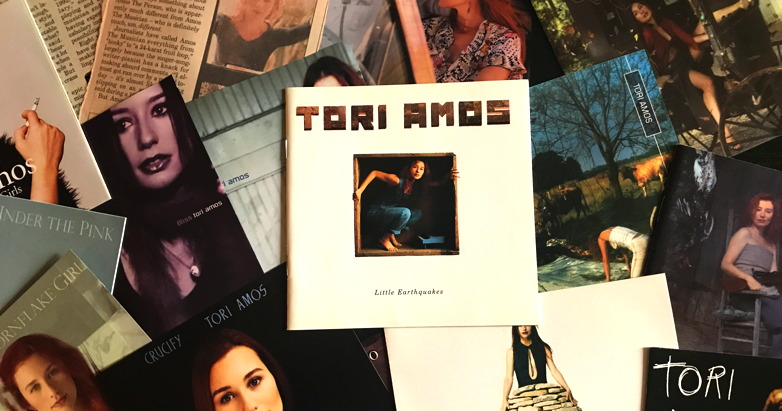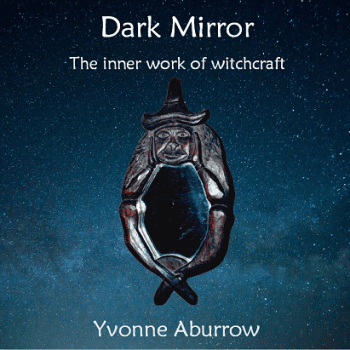[Welcome to “Mixtape of Shadows,” a hopefully-recurring feature in which I’ll take a look at musicians outside the somewhat insular world of Pagan music, both current artists and beloved musicians of yesteryear, whose work nevertheless touches on (or, in some cases, dives into) the magical, the mystical, the Pagan, and the just plain occult. If you’d like to listen along, a Spotify playlist (long enough to fit on a C-90 cassette!) is included below. Today’s subject is the passionately adored (and sometimes reviled) alt-rock siren of the Nineties, Tori Amos.]
In the summer of 1991, I moved back to the Central Valley of California after eight years in the South. I had no friends, no contacts, and no prospects. I was a sexually ambiguous, faintly androgynous 18-year-old college dropout with no idea who I was, what I wanted to be when I grew up, or what to do with myself in the meantime while I tried to figure those things out. I had just broken things off rather clumsily with my girlfriend before moving, and was alternating between self-loathing and a horrible loneliness. I felt broken and empty inside, and I was more than a little psychologically unstable in the way that only young, self-involved adults on the verge of their first nervous breakdowns can be.
This was, of course, the perfect moment in my life to encounter Tori Amos, the singer, songwriter, pianist, and confrontational feminist. Just as Morrissey was the poet laureate of awkward social misfits and Kurt Cobain was the voice for a generation of frustrated suburban kids, Tori was the poster girl and den mother for the whole hoary host of artsy, damaged teen-and-twentysomethings with bad pasts and no futures. For witches and other woo folks of a certain age (cough, cough), there are few artists who more closely exemplified what one might expect from the phrase “witchy rock star.” Her music wasn’t “Pagan rock” as such; rather, it was rock played by an artist one could easily believe was actually a witch, or possibly fey1.

Her debut album2, Little Earthquakes, exploded onto the scene in 1992 like nothing before it, seemingly equal parts Kate Bush and Screamin’ Jay Hawkins. It was a deeply confessional work, set to a piano-driven rock backdrop that alternated between lulling, pounding, and exploding in your face. It’s not overstating the case to say it was one of the most formative works of art of my early adulthood, one which changed my relationship with music and taught me that music could be spiritual, as I understood the word, rather than merely religious.
Of course, I know several people whose musical tastes I otherwise respect who practically spit blood when her name is mentioned, and I can understand why some folks found Little Earthquakes such a turn-off. To some ears, it’s a 57-minute endurance trial of an album in which Tori lilts and shrieks her way through an album of therapy session transcripts, pummeling her piano to within an inch of its life and daring you to flinch in a display of emotional exhibitionism that borders on the masochistically perverse. Outside of her songs, she can come across as a bit of a space cadet, like Stevie Nicks on mushrooms: thanking the faeries in her liner notes, talking about her songs as living creatures, and winging off on tangents about religion, history, and food.
And yet, underneath the surface distractions, there’s something in Tori’s music that outshines the Joni Mitchell influences, the Nick Cave morbidities, the Neil Gaiman references, and even the long, chilling shadow of Kate Bush. There’s a tenderness and compassion for all the broken birds out there, as exemplified in the title track, and a genuine passion driving her performance. For each flash of histrionics, there are shards of genuine tension and threat—sometimes in the same song, as with “Precious Things”—which make the melodrama, if not justifiable, at least excusable. The harrowing “Me and a Gun” lays bare both her trauma and her resolve to not be defined by it. In the delightful “Happy Phantom” she shares a vision of an afterlife both melancholic and tongue-in-cheek (“They say Confucius does his crossword with a pen / I’m still the angel to a girl who hates to sin”), while “Crucify” and “Tear in Your Hand” radiate grace and courage in the face of crippling despair.
In those moments, she becomes something even more impressive than a voice for all the wounded grown-up children of the world. She becomes something very like a hero and, in sharing her story with us, she invites us to become heroes ourselves.
This isn’t Tori’s best album; for that, I’d direct you to Boys for Pele or from the choirgirl hotel. It’s certainly one of the most flabbergasting, confounding, brilliant debut albums ever released, but she went on to greater heights of songcraft and performance in her later works, leavening the same brilliance and pathos found here with the maturity that comes with surviving one’s twenties and thirties. Taken as a whole, it becomes apparent that her entire oeuvre is shot through with magic: fey, wild, often incomprehensible, seemingly incoherent, enchanted and enchanting. It’s the magic of living in a spirit-haunted world, of sobbing on the bathroom floor at three in the morning, of learning to live and thrive in your own skin. It’s the magic of an animism that acknowledges and respects the spirit in all things, even the songs we sing and the stories we tell.
And here, for all the broken birds who saw faeries in the garden and the gutter, for all the baby-witches who revered Tori as the patron saint of walking through Hell and coming out the other side, is where her story began.
Tori Amos’ 15th studio album, Native Invader, is due to be released on Friday, September 8th.
___
- As Neil Gaiman wrote in her Dew Drop Inn tour program, “Tori is wise and witchy and wickedly innocent. What you see is what you get: a little delirium, a lot of delight. There’s fairy blood inside her, and a sense of humor that shimmers and illuminates and turns the world upside down.”
- Technically, her debut album was 1990’s Y Kant Tori Read, attributed to the band of the same name, but we’ll pass over that in silence.
















